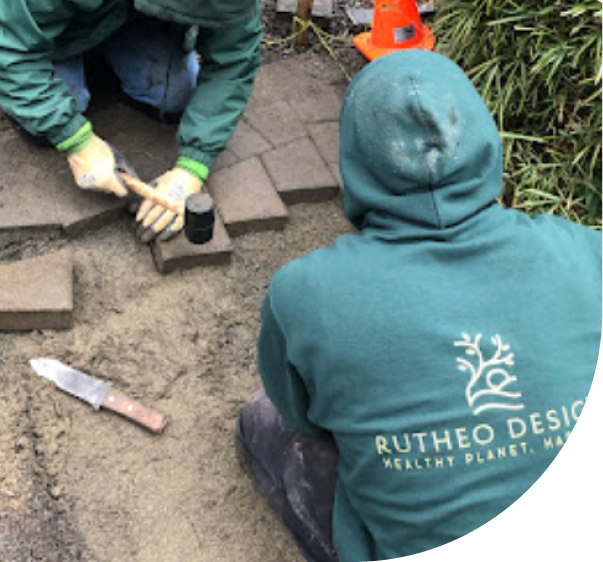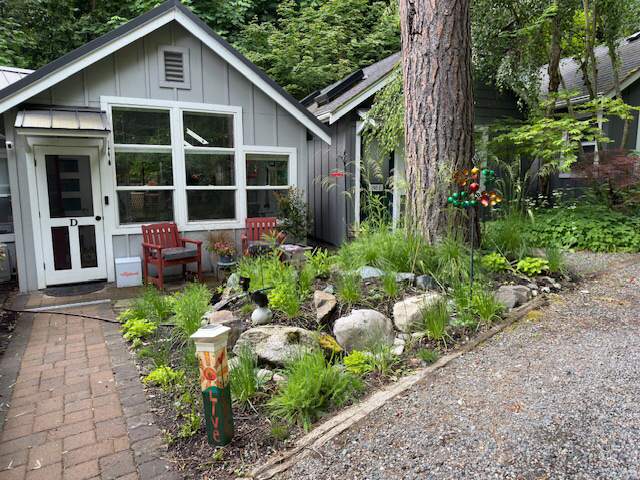
NW Native Wildflower Meadow Package: Est. $6.00/SQFT
Transformation of lawn to a native meadow by removing sod, adding topsoil, and seeding with Native Pollinator Meadow Mix from Northwest Meadowscapes. Creates a dynamic and ever-changing meadow landscape which will re-seed itself for years to come, and attract a wide variety of birds and insects. Truly a wild landscape, not one to be tended or mowed regularly. Only maintenance would be annual weeding of invasive species, and could be mowed short in fall to keep tidy. Most successful if planted in fall, winter, or early spring. Add-ons could include pathways, creek beds, decorative stones, bird baths, benches, or more.
NW Native Forest Garden Package: Est. $17.00/SQFT
Transformation of lawn to a native forest garden by either removing or sheet mulching sod, and planting a diverse array of site-specific native trees, shrubs, and groundcovers. Client can help choose specific selection of plants, and adjustments can be made for color, size, spacing, edibility, specific species habitat, etc. Can be left as a truly wild no-maintenance forest garden, or tended at any level of intensity to achieve the desired level of tidiness. Add-ons could include pathways, creek beds, decorative stones, birdbaths, benches, or more.
Rain Garden Package: Est. $6,500
Transform your roof-runoff into beautiful wildlife habitat with a rain garden. A gentle depression in the earth surrounded by native and flowering plants gives your downspouts a place to pour during the rainy season, allowing storm water to feed the soil and be filtered by the plants. Can be incorporated into a larger design, and is easily customizable depending on the interests and desires of the client.
We prioritize sustainable landscape design principles to create environmentally responsible outdoor spaces. Our approach includes selecting sustainable materials that have a low environmental impact and are long-lasting. We incorporate native plants and drought-tolerant species to ensure that your landscape thrives with minimal water use and maintenance. Water efficiency is a key focus, and we design landscapes that use natural irrigation methods, like rain gardens, and minimize the need for additional water sources.
Choosing eco-friendly materials for hardscape elements is essential to reducing the carbon footprint of your landscape. We use permeable pavers that allow water to seep into the ground, reducing runoff and promoting groundwater recharge. Recycled materials, such as reclaimed wood and recycled concrete, are also utilized in our projects to minimize waste and resource consumption. Natural stone is another excellent choice for its durability and low environmental impact, making it ideal for pathways, patios, and retaining walls.
Energy efficiency extends to the lighting we install in your landscape. We recommend utilizing solar-powered garden lights, which harness the sun’s energy and eliminate the need for electricity. LED lighting is another option, offering significant energy savings and a longer lifespan compared to traditional bulbs. In addition, we design lighting systems to minimize light pollution, ensuring that your garden remains a serene and natural environment, even after dark.
Maintaining a lush lawn without the use of synthetic chemicals is a cornerstone of our eco-friendly services. We focus on the benefits of avoiding synthetic fertilizers and pesticides, which can harm the environment and your lawn’s long-term health. Instead, we use organic alternatives for weed and pest control, such as corn gluten meal for weed prevention and neem oil for pest management. These methods not only protect your lawn but also contribute to a healthier ecosystem.
Our fertilization practices rely on organic materials, such as compost and natural soil amendments, to nourish your lawn. Compost enriches the soil, improving its structure and water retention capacity. We also use slow-release organic fertilizers that provide a steady supply of nutrients throughout the growing season. Our lawn care schedules are tailored to West Seattle’s climate, ensuring that your lawn receives the right nutrients at the right time, promoting vigorous growth and resilience.
We implement Integrated Pest Management (IPM) techniques to control weeds and pests in an environmentally friendly way. Our IPM approach combines cultural, mechanical, and biological controls to manage pests with minimal environmental impact. For example, natural herbicides like vinegar and citrus oil can effectively manage weeds, while companion planting can deter pests naturally. We also use biological controls, such as introducing beneficial insects that prey on garden pests, to maintain a balanced ecosystem in your landscape.
Water conservation is a priority in our landscaping projects, and we achieve this through the installation of smart irrigation systems. These systems are equipped with controllers that can be programmed to water your garden based on real-time weather data and soil moisture levels. Soil moisture sensors provide precise irrigation, reducing water waste by ensuring that your plants receive exactly the amount of water they need. This approach not only conserves water but also promotes healthier plant growth by avoiding over- or under-watering.
Rainwater harvesting is an excellent way to make use of West Seattle’s frequent rainfall. We design and install systems that capture rainwater, such as rain barrels and cisterns, which can then be used to irrigate your garden. These systems can be integrated with your existing irrigation setup, providing a sustainable source of water for your landscape. Using harvested rainwater not only reduces your reliance on municipal water but also supports the health of your plants by providing chemical-free water.
Xeriscaping is a landscaping method designed to reduce or eliminate the need for supplemental water. In West Seattle, where water conservation is increasingly important, xeriscaping is an effective way to create a beautiful, low-maintenance landscape. We select drought-resistant plants and ground covers that thrive in dry conditions, reducing the need for irrigation. Our designs also incorporate elements like mulching and soil amendments to retain moisture, further enhancing water efficiency in your landscape.
Healthy soil is the foundation of a thriving garden. It supports plant growth, stores water, and provides essential nutrients. We emphasize the importance of maintaining soil health as a core component of sustainable landscaping. By improving soil structure and fertility naturally, we create a more resilient garden that requires fewer inputs over time.
We use a variety of techniques to enhance soil structure and fertility. This includes incorporating organic matter, such as compost and well-rotted manure, which improves soil texture and increases its ability to retain moisture and nutrients. We also recommend practices like mulching and cover cropping, which protect soil from erosion and promote beneficial microbial activity.
Cover crops and green manure are powerful tools for improving soil health. We plant cover crops like clover, rye, and vetch during the off-season to add organic matter to the soil, prevent erosion, and suppress weeds. When these crops are tilled into the soil, they act as green manure, enriching the soil with nutrients and enhancing its structure. This practice not only improves soil fertility but also reduces the need for synthetic fertilizers.
Composting is a natural way to recycle garden waste and improve soil health. We encourage composting as it returns valuable nutrients to the soil, enhances its structure, and increases its water-holding capacity. By creating your compost from kitchen scraps, yard waste, and other organic materials, you contribute to a closed-loop system that reduces waste and builds healthier soil.
Organic mulch plays a vital role in maintaining soil health by retaining moisture, suppressing weeds, and adding nutrients as it decomposes. We recommend using mulches like wood chips, straw, or leaves, which are readily available and effective at protecting the soil. Each type of mulch has its specific uses, such as insulating roots in winter or preventing soil erosion on slopes.
Proper mulch application is key to maximizing its benefits. We suggest applying a 2-3 inch layer of mulch around plants, being careful to keep it away from the stems to prevent rot. Mulching in late spring or early summer helps retain soil moisture during dry periods, while a fall application can protect soil and plant roots from winter temperatures.
Soil erosion can be a significant issue in sloped gardens, but with the right techniques, it can be effectively managed. We use methods like terracing, which creates level planting areas on a slope, and installing retaining walls to hold soil in place. Additionally, planting deep-rooted plants or using ground covers can help stabilize the soil and prevent erosion.
Plants play a crucial role in preventing soil erosion. We recommend using ground covers, shrubs, and trees with extensive root systems that hold soil in place. In addition to stabilizing the soil, these plants can also improve its structure by adding organic matter and promoting microbial activity. Selecting the right plants for your garden’s specific conditions is key to a successful erosion control strategy.
For more severe erosion issues, we may suggest using erosion control blankets or installing terraces. Erosion control blankets, made from biodegradable materials like jute or coir, provide immediate protection to bare soil, allowing vegetation to establish. Terraces, on the other hand, create flat planting areas on steep slopes, reducing water runoff and soil loss. Both methods are effective at preventing erosion and can be integrated into your garden design for both functionality and aesthetics.

At Rutheo Designs, we are dedicated to transforming your outdoor spaces into beautiful, sustainable landscapes that reflect your vision and the unique character of the West Seattle area. Whether you’re looking to enhance your garden with native plants, need expert advice on water-efficient irrigation systems, or want to discuss a comprehensive landscape design, our team is here to assist you every step of the way. We understand that every project is unique, and we take the time to listen to your needs and offer personalized solutions that align with your goals and the local environment.
We invite you to reach out to us to start the conversation about your landscaping needs. You can contact us by email at connect@rutheodesigns.com or give us a call at (360) 844-2989. Whether you have specific questions or are ready to schedule a consultation, we’re eager to help you bring your outdoor vision to life with the care and expertise that Rutheo Designs is known for.